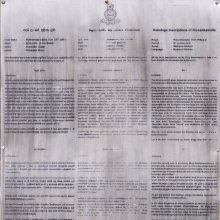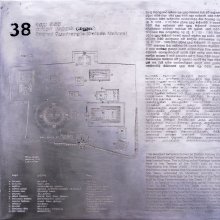Gata, Gātā: 20 definitions
Introduction:
Gata means something in Buddhism, Pali, Hinduism, Sanskrit, Jainism, Prakrit, Marathi, Hindi. If you want to know the exact meaning, history, etymology or English translation of this term then check out the descriptions on this page. Add your comment or reference to a book if you want to contribute to this summary article.
Alternative spellings of this word include Gaat.
Images (photo gallery)
(+1 more images available)
In Hinduism
Natyashastra (theatrics and dramaturgy)
Source: Wisdom Library: Nāṭya-śāstraGata (गति) or Gati or Prakṛti refers to a set of three rules used in the playing of drums (puṣkara) [with reference to Mṛdaṅga, Paṇava and Dardura] according to the Nāṭyaśāstra chapter 33.
The following are the three gatas:
- Tattva,
- Ghana (=Anugata),
- Ogha.

Natyashastra (नाट्यशास्त्र, nāṭyaśāstra) refers to both the ancient Indian tradition (shastra) of performing arts, (natya—theatrics, drama, dance, music), as well as the name of a Sanskrit work dealing with these subjects. It also teaches the rules for composing Dramatic plays (nataka), construction and performance of Theater, and Poetic works (kavya).
Jyotisha (astronomy and astrology)
Source: Wikibooks (hi): Sanskrit Technical TermsGata (गत).—Traversed, elapsed, past, preceding. Note: Gata is a Sanskrit technical term used in ancient Indian sciences such as Astronomy, Mathematics and Geometry.

Jyotisha (ज्योतिष, jyotiṣa or jyotish) refers to ‘astronomy’ or “Vedic astrology” and represents the fifth of the six Vedangas (additional sciences to be studied along with the Vedas). Jyotisha concerns itself with the study and prediction of the movements of celestial bodies, in order to calculate the auspicious time for rituals and ceremonies.
Shaktism (Shakta philosophy)
Source: Google Books: ManthanabhairavatantramGata (गत, “gone”) refers to one of the four characteristic features of the Śāmbhava (state), according to the Ciñcinīmatasārasamuccaya verse 4.57-58.—Accordingly, “Next I will explain something else namely, the characteristic feature of the Śāmbhava (state). Equal (sama), Gone Away (gata), Merger (laya) and Awakening (avabodha) as the fourth—(thus) Śāmbhava is said to be of four kinds”.

Shakta (शाक्त, śākta) or Shaktism (śāktism) represents a tradition of Hinduism where the Goddess (Devi) is revered and worshipped. Shakta literature includes a range of scriptures, including various Agamas and Tantras, although its roots may be traced back to the Vedas.
In Buddhism
General definition (in Buddhism)
Source: Wisdom Library: Dharma-samgrahaGata (गत) refers to the “six destinations” as defined in the Dharma-saṃgraha (section 57):
- naraka (hell world),
- tiryak (animal world),
- preta (ghost world),
- asura (demon world),
- manuṣya (human world),
- deva (god world).
The Dharma-samgraha (Dharmasangraha) is an extensive glossary of Buddhist technical terms in Sanskrit (e.g., gata). The work is attributed to Nagarguna who lived around the 2nd century A.D.
In Jainism
General definition (in Jainism)
Source: The University of Sydney: A study of the Twelve ReflectionsGata (गत) refers to the “goings” (of sentient beings), according to the 11th century Jñānārṇava, a treatise on Jain Yoga in roughly 2200 Sanskrit verses composed by Śubhacandra.—Accordingly, “In the world of the gods, in the world of men and in the plant and animal world, and also in hell, there is not that womb, not that form, not that place, not that family, there is not that suffering, not any pleasure [and] not that mode wherein these sentient beings are not destroyed by [their] comings and goings [com.—gatāgata] continually”.
Synonyms: Gamana, Yāta.

Jainism is an Indian religion of Dharma whose doctrine revolves around harmlessness (ahimsa) towards every living being. The two major branches (Digambara and Svetambara) of Jainism stimulate self-control (or, shramana, ‘self-reliance’) and spiritual development through a path of peace for the soul to progess to the ultimate goal.
Languages of India and abroad
Pali-English dictionary
Source: BuddhaSasana: Concise Pali-English Dictionarygata : (pp. of gacchati) gone; moved; walked; passed; arrived at; having come to a condition. || ñāta (pp. of jānāti), known; well-known; realised.
Source: Sutta: The Pali Text Society's Pali-English Dictionary1) Gata.—gone its course (of a legal enquiry, vinicchaya) Vin.II, 85 (cp. Vin Texts III, 26); J.II, 1.
2) Gata, (pp. of gacchati in medio-reflexive function) gone, in all meanings of gacchati (q. v.) viz.
2a) literal: gone away, arrived at, directed to (c. Acc.), opp. ṭhita: gate ṭhite nisinne (Loc. abs.) when going, standing, sitting down (cp. gacchati 1) D.I, 70; opp. āgata: yassa maggaṃ na jānāsi āgatassa gatassa vā Sn.582 (cp. gati 2). Also periphrastic (=gacchati 5 b): aṭṭhi paritvā gataṃ “the bone fell down” J.III, 26. Very often gata stands in the sense of a finite verb (=aor. gacchi or agamāsi): yo ca Buddhaṃ ... saraṇaṃ gato (cp. gacchati 4) Dh.190; attano vasanaṭṭhānaṃ gato he went to his domicile J.I, 280; II, 160; nāvā Aggimālaṃ gatā the ship went to Aggimālā J.IV, 139.
2b) in applied meaning: gone in a certain way, i.e. affected, behaved, fared, fated, being in or having come into a state or condition. So in sugata & duggata (see below) and as 2nd part of cpds. in Gen., viz. gone; atthaṃ° gone home, set; addha° done with the journey (cp. gat-addhin); gone into: taṇhā° fallen a victim to thirst, tama° obscured, raho°, secluded, vyasana° fallen into misery; having reached: anta° arrived at the goal (in this sense often combined with patta: antagata antapatta Nd2, 436, 612), koṭi° perfected, parinibbāna° having ceased to exist. vijjā° having attained (right) knowledge; connected with, referring to, concerning: kāya° relating to the body (kāyagatā sati, e.g. Vism.111, 197, 240 sq.); diṭṭhi° being of a (wrong) view; saṅkhāra°, etc.—Sometimes gata is replaced by kata and vice versa: anabhāvaṃkata›anabhāvaṃ gacchati; kālagata›kālakata (q. v.).
—atta (fr. attā) self-perfected, perfect D.I, 57 (expl. by koṭippatta-citto DA.I, 168); cp. paramāya satiyā ca gatiyā ca dhitiyā ca samannāgata M.I, 82; —addhin (adj. of addhan) one who has completed his journey (cp. addhagata) Dh.90; —kāle (in gata-gata-kāle) whenever he went J.III, 188; —ṭṭhāna place of existence PvA.38; =gamana in āgata-ṭṭhānaṃ vā: coming and going (lit. state of going) J.III, 188; —yobbana (adj.) past youth, of old age A.I, 138; Sn.98=124. (Page 242)

Pali is the language of the Tipiṭaka, which is the sacred canon of Theravāda Buddhism and contains much of the Buddha’s speech. Closeley related to Sanskrit, both languages are used interchangeably between religions.
Marathi-English dictionary
Source: DDSA: The Molesworth Marathi and English Dictionarygaṭa (गट).—m A body, band, gang; a confederate or congregate body. 2 A dense body (as of troops, cattle &c.) 3 An ingot or a lump (of gold, silver &c.)
--- OR ---
gata (गत).—p (S) Gone, departed, past. Ex. of comp. gatadaridra, gatadhana, gatabuddhi, gatabhaya, gatamāna, gatalajja, gataśrama, gatasanmāna, gatābhimāna, gatāvasāna, gatēndriya, gata- dhīra, gatadhairya, gatapratiṣṭha. Others in order. 2 Gone to, in, into, i. e. fixed or seated in or at. In comp. as antargata, madhyagata, hastagata.
--- OR ---
gata (गत).—f (gati S) State or condition (in an ill sense; corresponding to Pickle, plight, trim, mess, predicament). 2 Quitting (on being released from) the state of a bhūta or piśāca. v ghē. 3 In music. Quaver. v ghē. 4 A musical time or measure. 5 An expedient, a measure or means in prevention or cure: also a refuge or resource. Ex. ēvaḍhīṃ auṣadhēṃ ghētalīṃ tarīṃ tiḍīka rāhīnā ātāṃ kōṇatī gata karūṃ? 6 End, termination, issue. Ex. hā cōra āhē mhaṇūna māra khātō duṣkarmācī gata hīca. 7 Way, manner, fashion, course; but used elliptically with the power of "Like or resembling;" as vēḍyācē gata Like a madman, for vēḍyācē gatīnēṃ In the manner or style of a madman; hā bṛhaspatīcē gata bōlatō He speaks like the eloquent bṛhaspati.
--- OR ---
gata (गत).—p S In astronomy. Passed through--a mansion or sign in the transit of a heavenly body. Opp. to ēṣya Remaining to be passed.
--- OR ---
gāṭā (गाटा) [or टी, ṭī].—or ṭyā a Stubborn, self-willed, piggish, mulish.
--- OR ---
gāta (गात).—n (gātra S) A common term for the four pieces composing the frame of a bedstead, cot, or couch. aḍavēṃ gāta na ubhēṃ gāta (Neither a cross piece nor a long piece.) Used of speech, doings, manners, persons which are indefinite or indeterminate.
Source: DDSA: The Aryabhusan school dictionary, Marathi-Englishgaṭa (गट).—m A band, gang, confederate body. A dense body (as of troops, cattle &c.). A lump (of gold &c.).
--- OR ---
gata (गत).—f State or condition (in an ill sense), plight, predicament. (In music) Quaver. v ghē. A musical term or mea- sure. An expedient, measure or means; also a refuge or resource. Ex. ēvaḍhī ōṣadhēṃ ghētalīṃ tarī tiḍīka rāhīnā, ātāṃ kōṇatī gata karu? End, termination, issue. Ex. duṣkarmācī gata hīca. Way, manner, fashion; but used elliptically with the power of 'Like or resembling'; as vēḍyācē gata Like a madman. p Gone, departed, lost.
--- OR ---
gāṭā (गाटा) [-ṭī-ṭayā, -टी-टया].—a Stubborn, mulish.
--- OR ---
gāta (गात).—n A term for the four pieces compos- ing the frame of a bedstead, &c. āḍavēṃ gāta na ubhēṃ gāta (Neither a cross piece nor long piece.) Used of speech, doings &c. which are indetinite or indeterminate.
Marathi is an Indo-European language having over 70 million native speakers people in (predominantly) Maharashtra India. Marathi, like many other Indo-Aryan languages, evolved from early forms of Prakrit, which itself is a subset of Sanskrit, one of the most ancient languages of the world.
Sanskrit dictionary
Source: DDSA: The practical Sanskrit-English dictionaryGata (गत).—&c. see under गम् (gam).
See also (synonyms): gati.
--- OR ---
Gata (गत).—p. p. [gam-kta]
1) Gone, departed, gone for ever; Mu.1.25; किं गते सलिले सेतुबन्धेन, किं गते विवाहे नक्षत्रपरीक्षया (kiṃ gate salile setubandhena, kiṃ gate vivāhe nakṣatraparīkṣayā) Vb.4. 'what is the use of locking the stable-door when the steed is stolen ?'
2) Passed away, elapsed, past; गदायां रात्रौ (gadāyāṃ rātrau).
3) Dead, deceased, departed to the next world; गत एव न ते निवर्तते (gata eva na te nivartate) Kumārasambhava 4.3.
4) Gone to, arrived at, reaching to.
5) Being in, situated in, resting on, contained in; usually in comp.; प्रासादप्रान्तगतः (prāsādaprāntagataḥ) Pañcatantra (Bombay) 1 seated on &c.; सदोगतः (sadogataḥ) R.3.66 seated in the assembly; भर्तारं गता (bhartāraṃ gatā) Ś.4.13 united to a husband; so आद्य° (ādya°); सर्वगत (sarvagata) existing everywhere.
6) Fallen into, reduced to; e. g. आपद्गतः (āpadgataḥ)
7) Referring or relating to, with regard to, about, concerning, connected with (usually in comp.); राजा शकुन्तलागतमेव चिन्तयति (rājā śakuntalāgatameva cintayati) Ś.5; भर्तृगतया चिन्तया (bhartṛgatayā cintayā) Ś4; वयमपि भवत्यौ सखीगतं किमपि पृच्छामः (vayamapi bhavatyau sakhīgataṃ kimapi pṛcchāmaḥ) Ś1; so पुत्रगतः स्नेहः (putragataḥ snehaḥ) &c.
8) Frequented, resorted to; सुहृद्° (suhṛd°) Kumārasambhava 4.24.
9) Known, celebrated.
1) Directed towards, belonging to.
11) Known, understood.
-tam 1 Motion, going; गतमुपरि घनानां वारिगर्भोदराणाम् (gatamupari ghanānāṃ vārigarbhodarāṇām) Ś.7.7; Śiśupālavadha 1.2, 7.4.
2) Gait, manner of going; Kumārasambhava 1.34; हंस प्रयच्छ मे कान्ता गतिरस्यास्त्वया हृता (haṃsa prayaccha me kāntā gatirasyāstvayā hṛtā) V.4.16.
3) An event.
4) The place where one has gone.
5) Celebration, being known, diffusion; यावन्नाम्नो गतम् (yāvannāmno gatam) Ch. Up.7.1.5.
6) Manner. (As first member of comp. translated by 'free from', 'bereft of', 'deprived of', 'without'.)
Source: Cologne Digital Sanskrit Dictionaries: Edgerton Buddhist Hybrid Sanskrit DictionaryGata (गत).—adj., ppp., (1) understood, grasped (hardly a Sanskrit usage; compare however [Boehtlingk and Roth] s.v. gam, ppp. gata, 1, l): gatam etad Divyāvadāna 301.27, I have understood this (which you have said); etad api gatam 302.1, 5, 12; (2) exten- sions of the quasi-suffixal use of gata noted for Sanskrit by Whitney, Gr. 1273c; very close to the Sanskrit is perhaps Divyāvadāna 29.21 ekasya gṛhagataṃ kṣetragataṃ ca, ekasyā- vārīgataṃ deśāntaragataṃ ca, to one went (in a division of property) what was in the house and in the field (? or possibly the house(s) and field(s)? as in dṛṣṭigata, rūpagata, see below), etc.; Śikṣāsamuccaya 246.16 (tatra katamo 'bdhātuḥ ?) yad idam asmin kāye 'dhyātmaṃ pratyātmam āpaḥ, abgataṃ; aptvaṃ snehaḥ (abgataṃ perhaps what is water), snehagataṃ snehatvaṃ…; on dṛṣṭi-gata and rūpagata, which seem hardly distinguishable in meaning from dṛṣṭi and rūpa, see s.vv. (the former is found in Pali, the latter in AMg.).
Source: Cologne Digital Sanskrit Dictionaries: Shabda-Sagara Sanskrit-English DictionaryGata (गत).—mfn.
(-taḥ-tā-taṃ) 1. Gone. 2. Known, understood. 3. Obtained, gained. 4. Lost. n.
(-taṃ) 1. Going, motion. 2. Any thing past or done, an event. E. gam to go, in the participle past.
Source: Cologne Digital Sanskrit Dictionaries: Cappeller Sanskrit-English DictionaryGata (गत).—[adjective] gone, come; arrived at, got to, fallen into, situated, contained, or being in ([accusative], [locative] or —°); belonging or relating to (prati or —°); spread, celebrated, known as ([locative]); departed, gone away to ([dative] or [infinitive]); come forth from ([ablative] or —°); passed away, disappeared, lost, dead, often adj. °— whose — is gone, bereft of—, free from —, less; entered. frequented, visited; got, acquired. [neuter] going motion; disappearance, loss of (—°); extension, divulgation; way, manner.
Source: Cologne Digital Sanskrit Dictionaries: Monier-Williams Sanskrit-English Dictionary1) Gata (गत):—[from gam] mfn. gone, gone away, departed, departed from the world, deceased, dead, [Ṛg-veda i, 119, 4; Atharva-veda] etc.
2) [v.s. ...] past (as time), gone by, [Manu-smṛti viii, 402; Mahābhārata] etc.
3) [v.s. ...] disappeared (often in [compound]), [Manu-smṛti vii, 225; Mahābhārata] etc.
4) [v.s. ...] come, come forth from (in [compound] or [ablative]), [Rāmāyaṇa iv, 56, 10; Kathāsaritsāgara ii, 11]
5) [v.s. ...] come to, approached, arrived at, being in, situated in, contained in ([accusative] or [locative case] or in [compound] e.g. sabhāṃ g, ‘come to an assembly’ [Manu-smṛti viii, 95]; kānyakubje g, gone to Kānyakubja, [Pañcatantra v]; ratha-g, sitting or standing in a carriage, [Rāmāyaṇa iii]; ādya-g, turya-g, antya-g, taking the first, fourth, last place; sarva-g, spread everywhere, [Nalopākhyāna ii, 14]), [Ṛg-veda i, 105, 4; Atharva-veda x, 10, 32; Śatapatha-brāhmaṇa] etc.
6) [v.s. ...] having walked (a path [accusative])
7) [v.s. ...] gone to any state or condition, fallen into ([accusative] or [locative case] or in [compound] e.g. kṣayaṃ or kṣaye gata, gone to destruction; āpad-g, fallen into misfortune, [Manu-smṛti ix, 283]), [Taittirīya-upaniṣad; Manu-smṛti] etc.
8) [v.s. ...] relating to, referring to, connected with (e.g. putra-gata sneha, love directed towards the son, [Rāmāyaṇa i]; tvad-gata, belonging to thee)
9) [v.s. ...] walked (a path), frequented, visited, [Ṛg-veda vii, 57, 3; Rāmāyaṇa; Kumāra-sambhava]
10) [v.s. ...] spread abroad, celebrated, [Mahābhārata iii]
11) [v.s. ...] ‘known, understood’, having the meaning of ([locative case]), [cf. Lexicographers, esp. such as amarasiṃha, halāyudha, hemacandra, etc.]
12) [v.s. ...] n. going, motion, manner of going, [Mahābhārata iv, 297; Rāmāyaṇa; Śakuntalā vii, 7; Vikramorvaśī] etc.
13) [v.s. ...] the being gone or having disappeared, [Cāṇakya]
14) [v.s. ...] the place where any one has gone, [Pāṇini; Kāśikā-vṛtti]
15) [v.s. ...] anything past or done, event, [Horace H. Wilson]
16) [v.s. ...] diffusion, extension, celebration, [Chāndogya-upaniṣad vii, 1, 5]
17) [v.s. ...] manner, [Pāṇini 1-3, 21], [vArttika] 5.
Source: Cologne Digital Sanskrit Dictionaries: Yates Sanskrit-English DictionaryGata (गत):—[(taḥ-tā-taṃ) p.] Gone; past; known; obtained; lost. n. Motion.
Source: DDSA: Paia-sadda-mahannavo; a comprehensive Prakrit Hindi dictionary (S)Gata (गत) in the Sanskrit language is related to the Prakrit words: Aicchiya, Avaharia, Gaya, Ṇimmahia, Ṇiriṇāsia, Ṇīṇia, Parialia, Phiriya, Volia, Volīṇa.
[Sanskrit to German]
Sanskrit, also spelled संस्कृतम् (saṃskṛtam), is an ancient language of India commonly seen as the grandmother of the Indo-European language family (even English!). Closely allied with Prakrit and Pali, Sanskrit is more exhaustive in both grammar and terms and has the most extensive collection of literature in the world, greatly surpassing its sister-languages Greek and Latin.
Hindi dictionary
Source: DDSA: A practical Hindi-English dictionary1) Gaṭa (गट) [Also spelled gat]:—(nf) the sound produced while swallowing or gulping a liquid; ~[gaṭa] same as [gaṭa]; quikly, all at once; -[se] quickly, all at once.
2) Gata (गत) [Also spelled gat]:—(a) past, gone; dead; devoid of; pertaining to, in respect of; condition, plight; appearance; a musical time or measure; an air, a tune; —[kā] worthwhile, conforming to a standard; ~[kāla] past; ~[prāṇa] dead; lifeless; ~[prāya] almost past; —[māsa] ultimo: —[bajānā] to play an air/a musical tune; —[banānā] to reduce to a miserable plight; to give a thorough beating.
3) Gāta (गात) [Also spelled gaat]:—(nm) body, person.
...
Kannada-English dictionary
Source: Alar: Kannada-English corpusGaṭa (ಗಟ):—[noun] a round vessel of any size, made of metal or earthenware, with a small mouth, and a smaller neck, used for holding liquids; a pot.
--- OR ---
Gata (ಗತ):—
1) [noun] the urine (usu. of an animal); ಗತಗತ ನಾರು [gatagata naru] gata gata nāru to give off a strong, stinking smell.
2) [noun] (fig.) (a situation, condition) to be abhorrent, unbearable; to be offensive socially or morally.
--- OR ---
Gata (ಗತ):—
1) [adjective] moved away; departed; gone.
2) [adjective] ended; over; past.
3) [adjective] ruined.
4) [adjective] of or relating to a former time; bygone.
5) [adjective] descended (apparently, as the sun).
6) [adjective] reached; arrived.
7) [adjective] being within; inner.
8) [adjective] ಗತ ದಿನಾಂಕ [gata dinamka] gata dināṃka a date that is earlier than the current date; antedate.
--- OR ---
Gata (ಗತ):—
1) [noun] what has happened; a thing of the past.
2) [noun] the act of going (away).
3) [noun] the state of being; condition.
--- OR ---
Gāṭa (ಗಾಟ):—
1) [noun] that which is big, large or huge.
2) [noun] the quality of being so; largeness; bigness.
--- OR ---
Gāta (ಗಾತ):—[adjective] extending far downward from the top, inward from the surface; extending down, inward, etc. deep.
--- OR ---
Gāta (ಗಾತ):—
1) [noun] the quality or fact of being deep (usu. being difficult to measure the depth).
2) [noun] the quality or condition of being difficult to grasp or comprehend.
--- OR ---
Gāta (ಗಾತ):—
1) [noun] lack of something necessary for completeness; deficiency; defect.
2) [noun] something that may cause harm or injury; an instance of being exposed to harm or injury; peril.
Kannada is a Dravidian language (as opposed to the Indo-European language family) mainly spoken in the southwestern region of India.
See also (Relevant definitions)
Starts with (+187): Gata Honem, Gata Karanem, Gata-Kana-Kara-Dini-Dishi, Gata-karanem, Gata-rajya, Gatabala, Gatabandi, Gatabat, Gatabdha, Gatabhagya, Gatabharana, Gatabhartrika, Gatabhava, Gatabhaya, Gatabhi, Gatabhita, Gatabhramti, Gatabuddhi, Gatacetana, Gatacetas.
Ends with (+940): Abbhagata, Abbhuggata, Abhavasamudgata, Abhigata, Abhilapavigata, Abhinavagata, Abhinirgata, Abhirudgata, Abhisamanvagata, Abhisamgata, Abhogata, Abhrodgata, Abhyagata, Abhyasagata, Abhyashadagata, Abhyudgata, Abhyupagata, Abjasamudgata, Acacia rugata, Acaranugata.
Full-text (+1053): Gaya, Akshigata, Sugata, Sarvagata, Gatacetana, Gatasanga, Adhogata, Purogata, Gatavyatha, Gatalakshmika, Gatapratyagata, Tirogata, Pancagata, Tathagata, Gatajvara, Paragata, Parshvagata, Upadeshata, Atyantagata, Gat.
Relevant text
Search found 103 books and stories containing Gata, Gaata, Gāta, Gāṭā, Gaṭa, Gāṭa, Gātā; (plurals include: Gatas, Gaatas, Gātas, Gāṭās, Gaṭas, Gāṭas, Gātās). You can also click to the full overview containing English textual excerpts. Below are direct links for the most relevant articles:
Garga Samhita (English) (by Danavir Goswami)
Verses 2.24.48-49 < [Chapter 24 - The Story of Asuri Muni in the Rāsa-dance Pastime]
Verse 2.1.20 < [Chapter 1 - Description of the Entrance in Vṛndāvana]
Verse 5.16.26 < [Chapter 16 - Comforting Sri Radha and the Gopis]
Rig Veda (translation and commentary) (by H. H. Wilson)
Shrimad Bhagavad-gita (by Narayana Gosvami)
Verse 13.33 < [Chapter 13 - Prakṛti-puruṣa-vibhāga-yoga]
Verse 15.12 < [Chapter 15 - Puruṣottama-toga (Yoga through understanding the Supreme Person)]
Verse 3.15 < [Chapter 3 - Karma-yoga (Yoga through the Path of Action)]
The Tattvasangraha [with commentary] (by Ganganatha Jha)
Verse 2941 < [Chapter 25 - Examination of the Doctrine of ‘Self-sufficient Validity’]
Verse 3043 < [Chapter 25 - Examination of the Doctrine of ‘Self-sufficient Validity’]
Verse 1228 < [Chapter 17 - Examination of the Definition of Sense-perception]
Brihad Bhagavatamrita (commentary) (by Śrī Śrīmad Bhaktivedānta Nārāyana Gosvāmī Mahārāja)
Verse 2.3.43 < [Chapter 3 - Bhajana (loving service)]
Verse 2.2.12 < [Chapter 2 - Jñāna (knowledge)]
Verse 2.4.246 < [Chapter 4 - Vaikuṇṭha (the spiritual world)]
Related products






